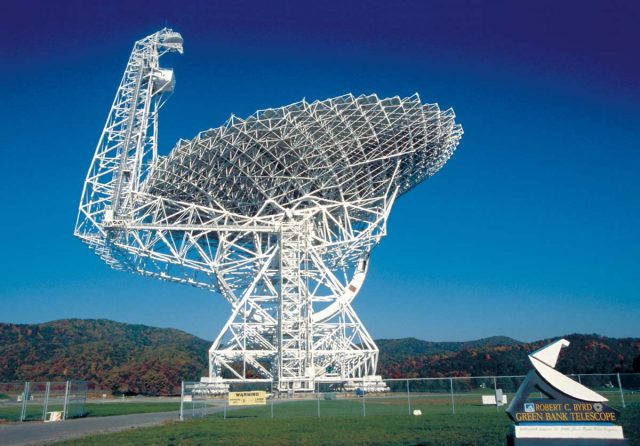SETI Researchers Have Begun Scanning the Backgrounds of Images for Alien Signals

The Breakthrough Listen Initiative, funded by billionaire Yuri Milner, is currently working to scan a million stars in our galaxy for evidence of intelligent life. There are no hits yet, but a new study proposes another way Breakthrough Listen could aid in the search for extraterrestrial life. Radio telescopes are not only sensitive to the target star but also to the space surrounding it. Perhaps, the new analysis suggests, there could be some aliens photobombing in the background.
Most searches for alien intelligence focus on stars in our galaxy, which is plenty vast to keep SETI researchers busy, but the pair behind the new preprint study think we could be looking farther afield. Michael Garrett of the University of Manchester and Andrew Siemion from the Berkeley SETI Research Center are more interested in the “astronomical exotica” in the deep background of Breakthrough Listen observations.
This research builds on a previous study from Siemion and Garrett that explored the impact of the European Space Agency’s Gaia space telescope, which has measured the location and proper motion of a billion stars in our galaxy. According to Motherboard, the pair explored how knowing the locations of foreground and background stars in an observational field can aid in the hunt for intelligent life. And it should work similarly for objects in other galaxies, provided we have similar distance measurements.

The Green Bank Telescope used by Breakthrough Listen.
Siemion and Garrett used the NASA/IPAC Extragalactic Database and Aladin sky atlas to build a “rudimentary census” of extragalactic objects. The catalog includes active galactic nuclei, interacting galaxies, and even one confirmed gravitational lens system. They next analyzed 469 Breakthrough Listen targets to see how many extragalactic objects might be lurking in the background. They came up with a whopping 143,024 objects.
Naturally, none of these frames offered clear evidence of alien intelligence or you’d have heard about it. Any signals from these regions of space would have to be incredibly powerful to be visible, but the number of stars in all those galaxies is unfathomably large, and that means a lot of potential places for aliens to build super-powerful extragalactic transmitters.
Siemion and Garrett say that it may be possible to detect signs of advanced civilizations even in these far-off parts of the universe. For example, extragalactic intelligences could build phased arrays with thousands of transmitters or a microwave emitter to propel solar sails. If we keep looking, perhaps we’ll find an alien photobomb.
Now read:

Comments are closed.